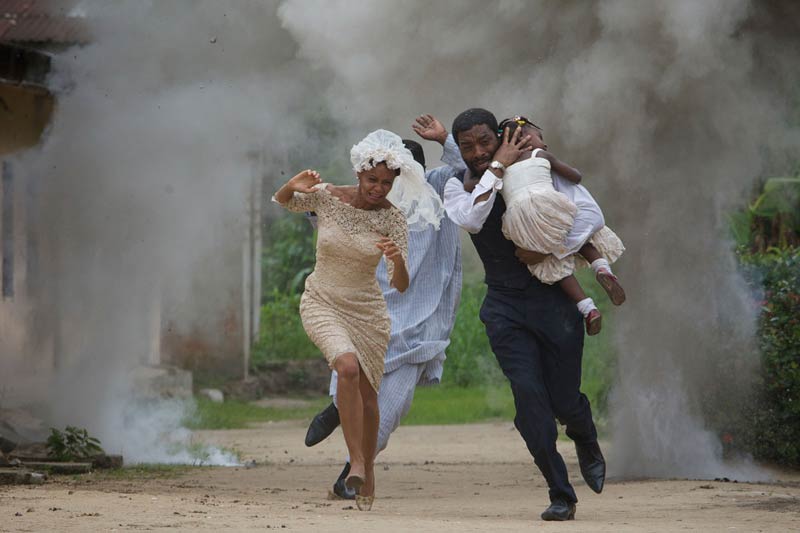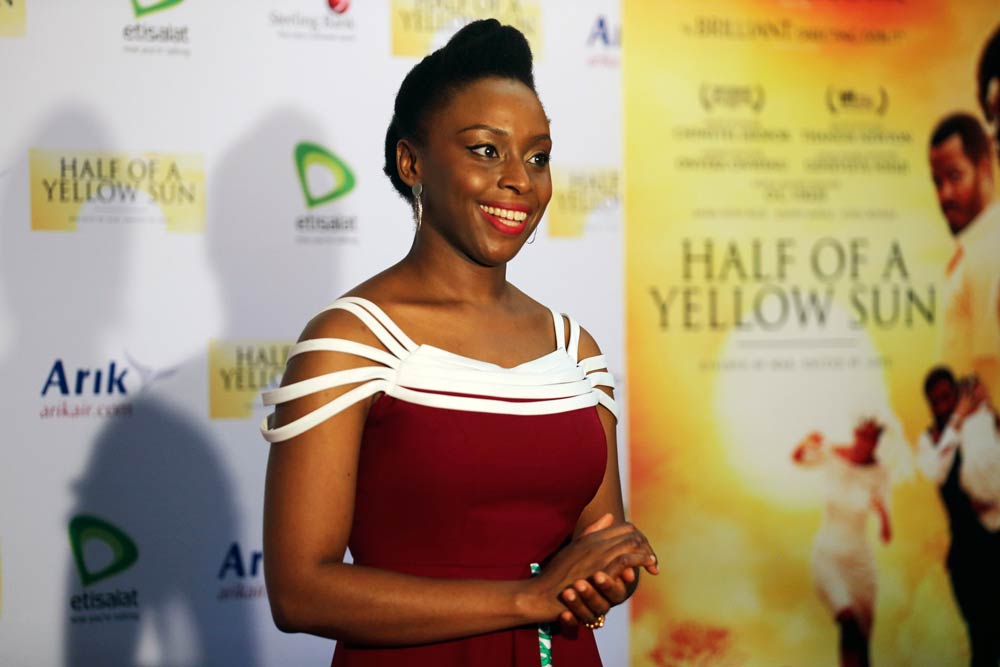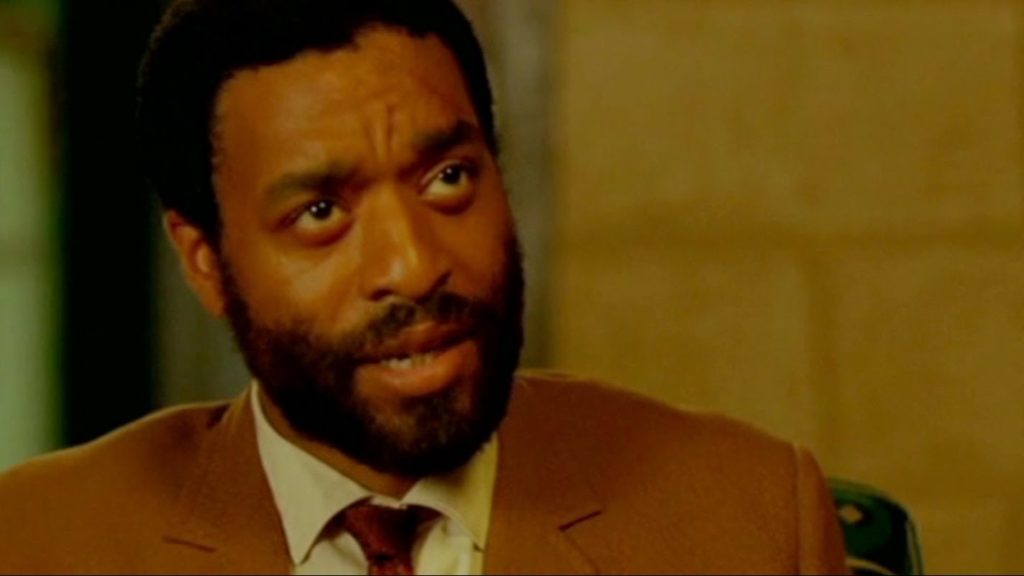Nigerian novelist Chibundu Onuzo reviews Half of a Yellow Sun, which premiered in Nigeria on August 1.
I went to two screenings of Biyi Bandele’s adaptation of Chimamanda Ngozi Adichie’s famous novel, Half of a Yellow Sun. The first screening was in an obscure Vue theatre, with a largely Nigerian audience, that whooped and called out throughout the movie. The second was in the Bafta building, with a sedate crowd that venomously shhhed me when I whispered a comment to my sister. The first time, I zoomed in on what I believed were the movies fatal flaws: Thandie Newton’s unplaceable accent when speaking English, Thandie Newton’s unplaceable accent when speaking Igbo and the lack of the epic in a movie that is set during the Biafran War, one of the most brutal conflicts of the 20th century. The second time, I approached with a more open mind, ready to accept the movie for what it is rather than what I wanted it to be and I discovered that the director, Biyi Bandele, has made his own film, his own triumph. This is a subtle movie of a large war, intimate and revealing of the personal tragedies that took place from July 1967 to January 1970.
The movie opens with the sisters Olanna and Kainene played by Thandie Newton and Anika Noni Rose. They are beautiful, rich and fashionable in the stylised chic way of the sixties. The period is evoked with footage from the era as well as a beautifully researched set. Olanna and Odenigbo (Chiwetel Ejiofor) are soon introduced as lovers. Kainene and the English, somewhat spineless Richard (Joseph Mawle), also become lovers. Through these two relationships, the vibrancy of pre-war Nigeria is explored: the highlife music, the Lagos high society, the heated intellectual discussions at the University of Nsukka where Olanna and Odenigbo are both lecturers. And then the war comes.
The Nigerian Civil War was global news and personal tragedy. I know this from my father and my uncles who lived through the war and speak not of genocide and federalism but of exams left midway, school terms disrupted and clothes destroyed. Bandele captures this movingly in the scene where the war arrives on the doorstep of Olanna and Odenigbo’s carefully built citadel of books and philosophers and good wine. They must hastily compress their life into a few suitcases, flung into the back of a car. What to choose? What to take before they must run? Olanna is cooking. She carries the pot with her as they flee.
In my first viewing, I was annoyed by the fact that the Biafran War seemed reduced to the love triangles and squares of these four main characters. General Emeka Ojukwu, leader of Biafra, is seen only in black and white footage. There is no character cast to flesh out this charismatic leader of the Biafrans. General Jack Gowon, leader of the Nigerian army is never mentioned. The grand actors are mostly silent. In my second viewing, I was drawn into the intimacy of these four lives. The brief clips of original news footage; the short radio bursts of famous speeches: this was how those living through the war would have experienced the events now neatly highlighted by History as grand. People lived through the epic in very mundane ways. They got married like Odenigbo and Olanna. Brides fussed over the fit of their wedding dresses and sometimes, wedding feasts were interrupted by bombs. The next day, life went on.

It is Chiwetel Ejiofor’s first feature since Twelve Years a Slave and this role is sufficiently different for one to be excited to see what he will do next. I did Thandie Newton a disservice in my first assessment. She may not correctly pronounce ‘kedu,’ a common Igbo greeting, but she is utterly compelling as Odenigbo’s long suffering and contradictory lover, who will not marry him in peace time but will do so in the middle of a war. Anika Noni-Rose and Joseph Mawle also give strong performances, with Noni Rose capturing the hauteur and vulnerability of Kainene with great skill. Yet the standout performance for me, was given by Onyeka Onwenu who played Mama: the mother-in-law from hell.
Onwenu or ‘the elegant stallion’, is better known as a singer. Yet she was perfect for this role of eye-rolling, abuse spitting venom. Eavesdropping on conversations after the Bafta screening, I heard the noun ‘caricature’ thrown around a few times. “Such people exist!” I wanted to say, but I had already been shushed once that evening. In the Vue screening, surrounded by Nigerians, there was only adulation for Onwenu. We all knew women like Mama, who tried to control their families with manipulation and tradition. There was no talk of caricatures there.
The movie is not a facsimile of Chimamanda’s much beloved novel. Most strikingly, in the novel Ugwu, the houseboy, is the main narrator. Yet in the film, the sisters, Olanna and Kainene take centre stage. Biyi Bandele, explaining this choice at a pre-screening, said that too often the African domestic had been given the foreground in films made of the continent. It was time for new stories to emerge. Stories of women like Olanna and Kainene; stories of sophistication and accusations of witchcraft because Africa is not one thing. There will be time for other epics on the war; for gun battles and air raids, for army commanders and young Generals. For now, let us celebrate Bandele’s movie for what it is: a triumph.
Brittle Paper is an African literary blog featuring book reviews, news, interviews, original work and in-depth coverage of the African literary scene. It is curated by Ainehi Edoro and was recently named a ‘go-to book blog’ by Publisher’s Weekly.



